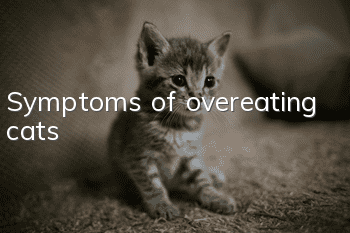Symptoms of overeating cats

Symptoms of overeating cats include: If you touch the cat’s abdomen with your hands, you will find obvious bulging, and some cats’ intestines and stomach will start to protect themselves: such as vomiting undigested food, loose stools, and some cats will have diarrhea. Symptoms of constipation. At this time, the owner should start to help the cat regulate its intestines and stomach. Cats' gastrointestinal tract is very fragile. If they eat irregularly for a long time, it will cause serious gastrointestinal problems, affect the cat's normal eating, and cause malnutrition.
Methods for recuperating the gastrointestinal tract of cats after eating:
1. Fasting the cat for 12-24 hours, and feeding the pet probiotics to help recuperate the gastrointestinal tract. Do not use it when resuming the diet. Be anxious to feed dry food. At this time, the cat's gastrointestinal function is in the recovery stage. You can first feed some easy-to-digest liquid foods such as meat porridge, fish soup, or goat milk-soaked cat food.
2. Gradually transition from small and frequent meals to regular and quantitative meals, control eating within half an hour, and remove the food bowl regardless of whether it is eaten or not, to help cats develop reasonable and healthy scientific eating habits.
3. Choose high-quality cat food with a protein content of more than 40%. Cats are pure carnivores, and about 50% of their daily energy needs come from protein. Parents can increase their feeding appropriately. Give cats some complementary foods such as boiled chicken breast, crucian carp, and cooked egg yolks.
4. Regularly feed hair-reducing cream to help cats lose hair, guide cats to drink more water, help gastrointestinal motility, and remove intestinal garbage.
5. Guide the cat to exercise every day, ensure a certain amount of exercise, and do not let it lie down or gain weight.
6. Do not feed food with bones or fish bones. Be sure to remove them before feeding them to the cat. Otherwise, the bones cannot be digested in the cat’s intestines and stomach, which may cause bone calcification in the long run.
7. Do not feed raw vegetables, raw meat, and raw water, as these may cause diarrhea or parasite infection in cats.
8. Regularly carry out internal and external deworming treatment for cats.
- Why is the kitten's whiskers broken?
- Why do orange cats gain weight so easily?
- What’s the reason why cats don’t like to move or have energy?
- How cats express love
- Are Bombay cats clingy? How much does one cost?
- What toys do cats like to play with? What should you pay attention to when playing with cats?
- Why does a cat have bloody stools?
- How to train a civet cat to eat well
- Can three-month-old kittens go outside?
- How to cut a kitten's nails



